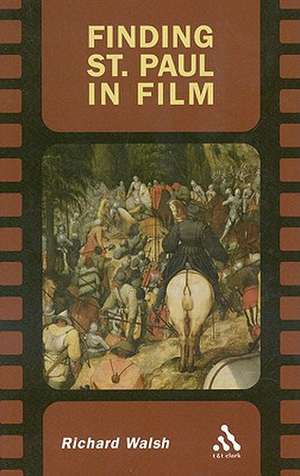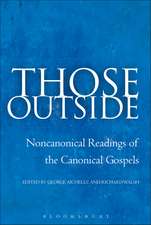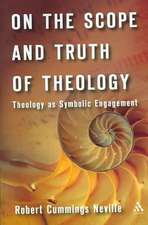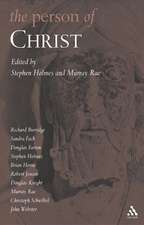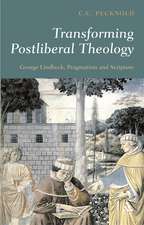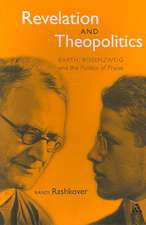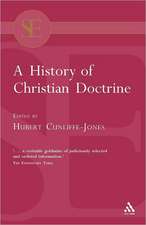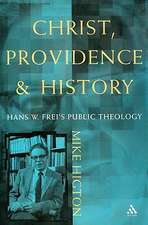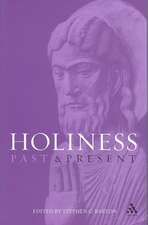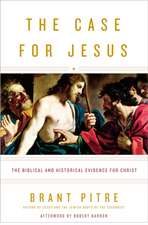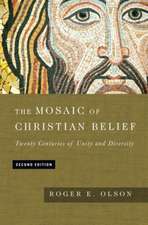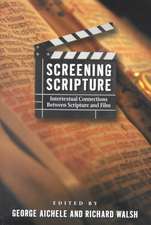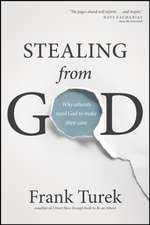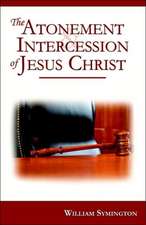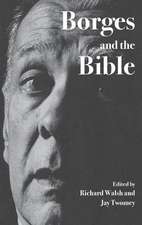Finding St. Paul in Film
Autor Professor Richard Walshen Limba Engleză Paperback – 31 dec 2005
Preț: 270.75 lei
Preț vechi: 310.51 lei
-13% Nou
Puncte Express: 406
Preț estimativ în valută:
51.81€ • 54.10$ • 42.78£
51.81€ • 54.10$ • 42.78£
Carte tipărită la comandă
Livrare economică 15-29 aprilie
Preluare comenzi: 021 569.72.76
Specificații
ISBN-13: 9780567028501
ISBN-10: 056702850X
Pagini: 224
Dimensiuni: 154 x 228 x 14 mm
Greutate: 0.37 kg
Editura: Bloomsbury Publishing
Colecția T&T Clark
Locul publicării:New York, United States
ISBN-10: 056702850X
Pagini: 224
Dimensiuni: 154 x 228 x 14 mm
Greutate: 0.37 kg
Editura: Bloomsbury Publishing
Colecția T&T Clark
Locul publicării:New York, United States
Recenzii
"Walsh concentrates not on these rare explicit film but instead on a few well-known films, that, in his view, have motifs or messages related to the characteristic concerns of Paul's theology... part of the author's purpose is to expose how challenging and difficult the 'real' Paul is for the modern sensibilities." -The Bible Today, April/May 2006
Mention -Theology Digest, Summer 2006
Mention in Religion and the Arts, Vol. 13, 2009.
"Finding St. Paul in Film reads contemporary movies alongside the values expressed in Paul's letters to argue that Paul's authoritarian intransigence, apocalyptic vision, and rejection of 'this world' are dangerous in the contemporary world. Walsh shows that Christian interpreters' multiple 'domesticated' Pauls conceal the psychotic revolutionary Paul of his letters. 'Saving Paul' is not Walsh's agenda, but his critical appraisal of appropriated Pauls should not be ignored. This responsible, scholarly, controversial, and readable book addresses crucial issues of our time. No one should miss it." -Margaret R. Miles, Emerita Professor of historical theology, Graduate Theological Union; author of Seeing and Believing: Religion and Values in the Movies
"Movie sequels often disappoint, but Walsh's sequel ably continues the sort of experiment that he began in Reading the Gospels in the Dark. Of course, 'Paul movies' and 'Paul figures' are harder to find than their 'Jesus' counterparts, but Walsh not only finds Paul in relation to a wide array of movies, but he does so with insight and originality. Anyone with interests in Paul, Christianity, or popular culture will want to read this book." -George Aichele, Adrian College, author of The Control of Biblical Meaning: Canon as Semiotic Mechanism and co-author of Screening Scripture: Intertextual Connections Between Scripture and Film
Richard Walsh skillfully uses his expansive knowledge of film to engage his readers with his even more expansive knowledge of Pauline studies. Walsh's use of film provocatively challenges readers to consider scripture's multiple Pauls in a way that critically disrupts easy identification with the ideological justifications accomplished in his name. Finding St. Paul in Film offers a nuanced critique of Paul in ways that are imminently accessible to students and scholars alike. Erin Runions Assistant Professor of Religious Studies, Pomona College
"Richard Walsh's latest contribution to Religion and Film Studies, Finding St. Paul in Film, challenges the reader to watch Paul through the movies, or perhaps to watch the movies through Paul. The many Pauls of Christian theology and discourse arise through films in surprising, if not revelatory ways. So, Paul allows us to better understand "grace" in Tender Mercies and other theological concepts in movies like The Apostle and A Beautiful Mind. Walsh's creative viewfinder (Paul) projects a new image for some of our best loved films." -Conrad Ostwalt, author of Secular Steeples: Popular Culture and the Religious Imagination
Finding St. Paul in films seems a mite harder than finding God in the movies. Nevertheless, intrepid author Walsh (Methodist College, Fayetteville, NC) scours the popular canon of Hollywood to identify footprints of the protean apostle to the Gentiles, finding ambiguous clues and disturbing traces. Confronting the paulytheistic constructions of multiple Pauls, Walsh questions the philosophers of Mars Hill, using the dialectic of Hollywood films, to unmask idolatry. In particular, he wages a gentle but incisive debate with Robert Jewett's more liberal, modern, and domesticated interpretation of the apostle (Saint Paul at the Movies, CH, May'94, 31-4875) as viewed through the lenses of Bruce Beresford's film Tender Mercies. Walsh's intertextual conversations circumnavigate five major Pauline topics: grace, apocalypse, death-obsession, ethics, and Paul's own canonical status. Seeking to break open the insularity of academic theological constructs, Walsh exhibits a refreshing humility and a rigorous honesty in radically honing in on the threat of Paul and the scandal of his gospel. From the problem of theodicy in Woody Allen's Crimes and Misdemeanors to the cultural myth of individual freedom set forth in Pleasantville, Walsh manages to let Paul, fellow sinner and fellow saint, speak prophetically to moviegoers everywhere. Summing Up: Recommended. Upper-level undergraduates through faculty/researchers.
"Walsh's dialogue with modern and post-modern theologians and philosophers can be challenging and provocative... While the exploration could have been accomplished without recourse to movies, it would not have been nearly as much fun." -Interpretation
Mention -Theology Digest, Summer 2006
Mention in Religion and the Arts, Vol. 13, 2009.
"Finding St. Paul in Film reads contemporary movies alongside the values expressed in Paul's letters to argue that Paul's authoritarian intransigence, apocalyptic vision, and rejection of 'this world' are dangerous in the contemporary world. Walsh shows that Christian interpreters' multiple 'domesticated' Pauls conceal the psychotic revolutionary Paul of his letters. 'Saving Paul' is not Walsh's agenda, but his critical appraisal of appropriated Pauls should not be ignored. This responsible, scholarly, controversial, and readable book addresses crucial issues of our time. No one should miss it." -Margaret R. Miles, Emerita Professor of historical theology, Graduate Theological Union; author of Seeing and Believing: Religion and Values in the Movies
"Movie sequels often disappoint, but Walsh's sequel ably continues the sort of experiment that he began in Reading the Gospels in the Dark. Of course, 'Paul movies' and 'Paul figures' are harder to find than their 'Jesus' counterparts, but Walsh not only finds Paul in relation to a wide array of movies, but he does so with insight and originality. Anyone with interests in Paul, Christianity, or popular culture will want to read this book." -George Aichele, Adrian College, author of The Control of Biblical Meaning: Canon as Semiotic Mechanism and co-author of Screening Scripture: Intertextual Connections Between Scripture and Film
Richard Walsh skillfully uses his expansive knowledge of film to engage his readers with his even more expansive knowledge of Pauline studies. Walsh's use of film provocatively challenges readers to consider scripture's multiple Pauls in a way that critically disrupts easy identification with the ideological justifications accomplished in his name. Finding St. Paul in Film offers a nuanced critique of Paul in ways that are imminently accessible to students and scholars alike. Erin Runions Assistant Professor of Religious Studies, Pomona College
"Richard Walsh's latest contribution to Religion and Film Studies, Finding St. Paul in Film, challenges the reader to watch Paul through the movies, or perhaps to watch the movies through Paul. The many Pauls of Christian theology and discourse arise through films in surprising, if not revelatory ways. So, Paul allows us to better understand "grace" in Tender Mercies and other theological concepts in movies like The Apostle and A Beautiful Mind. Walsh's creative viewfinder (Paul) projects a new image for some of our best loved films." -Conrad Ostwalt, author of Secular Steeples: Popular Culture and the Religious Imagination
Finding St. Paul in films seems a mite harder than finding God in the movies. Nevertheless, intrepid author Walsh (Methodist College, Fayetteville, NC) scours the popular canon of Hollywood to identify footprints of the protean apostle to the Gentiles, finding ambiguous clues and disturbing traces. Confronting the paulytheistic constructions of multiple Pauls, Walsh questions the philosophers of Mars Hill, using the dialectic of Hollywood films, to unmask idolatry. In particular, he wages a gentle but incisive debate with Robert Jewett's more liberal, modern, and domesticated interpretation of the apostle (Saint Paul at the Movies, CH, May'94, 31-4875) as viewed through the lenses of Bruce Beresford's film Tender Mercies. Walsh's intertextual conversations circumnavigate five major Pauline topics: grace, apocalypse, death-obsession, ethics, and Paul's own canonical status. Seeking to break open the insularity of academic theological constructs, Walsh exhibits a refreshing humility and a rigorous honesty in radically honing in on the threat of Paul and the scandal of his gospel. From the problem of theodicy in Woody Allen's Crimes and Misdemeanors to the cultural myth of individual freedom set forth in Pleasantville, Walsh manages to let Paul, fellow sinner and fellow saint, speak prophetically to moviegoers everywhere. Summing Up: Recommended. Upper-level undergraduates through faculty/researchers.
"Walsh's dialogue with modern and post-modern theologians and philosophers can be challenging and provocative... While the exploration could have been accomplished without recourse to movies, it would not have been nearly as much fun." -Interpretation
